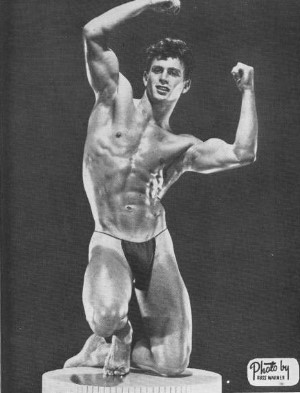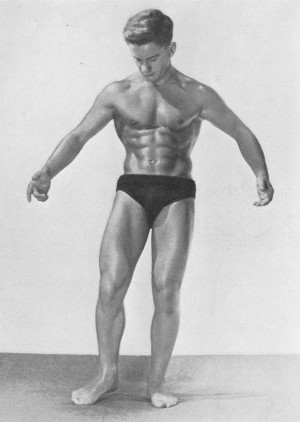by Peter Carrick
YOU know, the people who bound through life in a natural, confident manner, those self-possessed, positive-thinking individuals, never fully realise how lucky they really are. In any endeavour, and especially in bodybuilding, they start out with a tremendous advantage over their more negative-minded friends. That doesn’t mean, however, that a retiring, negative individual should be content to sit back and use his inferiority as an excuse for his lack of progress.
If you happen to be one of those unfortunate people who, like myself, are naturally prone to worry and a negative attitude towards life, then you must learn what to do so that your way of life will be improved.

Practical psychology is, without doubt, your saviour.
In my last article I told you that practical psychology, when properly applied, could help the negative-minded bodybuilder to derive more benefit from his training. This month I intend to explain how certain principles of practical psychology can best be applied by the body-builder for his own benefit.
Firstly, the essential ingredients for a more positive and therefore more successful life I define briefly as: (1) confidence; (2) enthusiasm; (3) concentration; (4) determination; (5) the elimination of all worry and anxiety; (6) the planning of your general life in accordance with your aims.
If the negative-minded person will only understand that all his actions and endeavours are governed by these six very important principles, a more successful life will certainly be assured. Let us see, then, how we can encourage these qualities so that we may become more successful.
Many body-builders who achieve only limited success from their training have solely their lack of confidence to thank for their unfortunate condition. You can see examples of this type of person almost everywhere. Sometimes they are called ” grasshoppers,’* for they flit from schedule to schedule with a regularity duplicated only by time itself. New exercises are discreetly tucked on to the end of their workout — just to give that little bit extra and all the new bodybuilding theories are thoroughly studied and religiously applied.
Unfortunately, these theories often prove to be very conflicting. Nevertheless, the poor negative body-builder persists in his attempts to determine which theory is correct, but, unable to do so, a state of unsettled ness results. Doubts regarding the efficiency of the adopted course of training creep into the poor human mind.
Is this exercise good for my body type? What of the energy output during workout? Mr. X in the current edition of ” Z ” magazine advocates only three exercises for my body type and here I am slogging myself by doing six. Little wonder I can’t gain. I think I d better change my schedule around a bit. So it progresses, with mental conflict increasing as each new theory is read, until finally the pupil either gives up in disgust, completely disillusioned, or at best achieving only a small percentage of the success which could surely be his. And all this because he has little or no confidence in his own methods.
However, though the brake on progress brought about by an extreme lack of confidence can be very severe, practical psychology and thought training can, in no small measure, help to overcome this undesirable condition.
The first thing to do is to scrap the course of training you are doing at present. This may seem rather drastic, but you obviously have no confidence in its effectiveness, so what’s the use in carrying on?
The next step is to take a rest for a week or so from all training. During this time define your immediate needs. Maybe it’s all-round development, possibly leg concentration, or upper body work might be your prime necessity. Take your time, think clearly and become quite certain about this. When you have finally decided, insist on having the best possible course available which will satisfy these needs.
This doesn’t necessarily entail a huge financial outlay, for the country’s best body-building authorities are always willing to advise you at the low cost of a stamped, addressed envelope. Practical psychology insists that you make conditions as favourable for progress as possible, so it is vital that you adopt a schedule of training which you believe in your own mind to be the best.
These seemingly unimportant points are nevertheless absolutely essential for success, for only by insisting on having what he believes to be the best possible instructor and instruction available can the negative-minded individual ever hope to have sufficient faith and confidence to make reasonable headway.
Once you have finally decided on your course, firmly resolve to believe in its efficiency. You’ve decided on the best instruction, therefore you simply must improve with it. Keep asserting to you are becoming bigger and more muscular—that this is the one and only course for you. Forget about all other so-called theories, and refuse to have anything whatever to do with any ‘ pet” exercises which certain stars may insist were the cause of their outstanding development. You have your course, the one made specially for you. Be confident of ihe final result. Stick to your training and let other people get on with theirs.
When this confidence is firmly established, insist that it will be sustained completely for as long as possible. Don’t expect results in a fortnight. No course will improve you in that time. You must give it a chance to work, therefore confidence must be kept up for at least a couple of months. This shouldn’t, in fact, prove to be very difficult, because you’ll find that if you continue to fill your mind with confident, positive thoughts, you’ll tend to become naturally more enthusiastic and confident. Remember, always, that confidence is essential to complete success.
Earlier we accepted that a more positive life has six essential qualities. We have dealt with the first, the ways of developing confidence: now we come to another important point, the problem of sufficient enthusiasm.
My dictionary defines the word enthusiasm thus: an ecstasy of mind; ardent zeal; elevation of fancy. Personally, I prefer to think about enthusiasm in a more modern sense, i.e., as keenness. Keenness is so closely connected with inspiration, particularly in body-building, that I feel we cannot conveniently speak of one without the other. In nearly all cases you’ll find additional enthusiasm to be a natural consequence of increased inspiration.

To show interest in body-building at all shows that certain enthusiasm is there. Sometimes, generally when results seem hard to get, enthusiasm sinks to a low ebb, this action in turn tending to encourage the negative emotions of depression and frustration. Practical psychology, if it is to benefit the indifferent body-builder, must show means whereby a good proportion of enthusiasm can be kept up even when major obstacles are encountered, so that the life of the individual may be kept flowing in a more or less positive way.
You’ll notice I said only a proportion of the enthusiasm must be keet up. Why not all of it? It would, of course, be ideal if we could maintain maximum enthusiasm even when faced by great difficulties. I believe that only a few of the more naturally positive-thinking individuals can be at the peak of enthusiasm all the time. It’s my belief that a lack of enthusiasm, at such times when results shown (comparatively speaking) are far below normal, is quite a natural manifestation of the human mind.
Therefore we must realise from the start that enthusiasm will tend to dwindle at times. If we fail to grasp this important fact, we shall only impede our progress still further. Simply by showing concern at our lack of enthusiasm we will encourage still extra depression and therefore even less favourable results will come from our training. So first accept this fact; then concern yourself with the problem of stimulating your feelings, so that this depression period will be as short as possible.
Remember, I said earlier that enthusiasm is generally a natural consequence of increased inspiration. Here, then, lies our answer. In inspirational psychology we find the solution to our problem of inadequate enthusiasm. We’ve all experienced the additional feeling of well-being and increased keenness for training after reading a certain person’s success story or the fine articles written for BODY CULTURE by David Martin and Henry Atkin. After reading such articles we have gone to our barbell and trained, perhaps with more confidence, more happiness and more enthusiasm than for a long time. This, my friends, is because we have been inspired by what we have read.
The very fact that magazines like BODY CULTURE are so consistently enthusiastic in their whole make-up is one reason they are so very desirable. Each month BODY CULTURE, in addition to supplying the best possible technical advice, provides inspiration for thousands of body-builders simply because its instruction, articles, photographs and advice always appear to be so enthusiastic about the whole physical culture game. So when your enthusiasm is below par, turn to inspiration to rekindle that lost spark of keenness.
If you read a success story which particularly impresses you by its triumph over adversity, or even a short news item for that matter, cut it out and put it safely away in a drawer. Do this until you have a little collection, say, 10 or 12, and see they are kept clean, tidy and readable. Keep these stimulating episodes ready for when you arc a little depressed or dissatisfied with your progress. At such times read the inspirational stories over, slowly and deliberately. Continue reading them until your mind is able to completely realise the great difficulties which these successful people had to conquer in their journey to success.
If there is a personal friend whom you particularly admire for his courage and enthusiasm, he may provide you with the inspiration you are seeking. Go to this person and talk to him. Ask advice, and try and adopt a little of his philosophy of life. In these ways you’re certain to benefit. For further inspiration, read the life stories of the world’s famous men and women. You’ll be amazed to find that many of them achieved their greatness in spite of almost impossible odds.
Another good thing is not always to train on your own. I’m sure readers who were in the services during the last war will bear me out when I say that it was only because of the great comradeship which prevailed, and the fact that there was always someone apparently keen, enthusiastic, happy and optimistic, that the miserable, often appalling, war conditions were endured at all.
Certainly, enthusiasm can be very infectious; so if you happen to train alone and suffer from non-enthusiastic spells, try trotting down to the nearest club and chatting with other body-builders. Mix with confident people, people who also share your ideals; the feeling of being ”alone ” is often very real and depressing. Remember, above all, that the majority of your problems in bodybuilding can be helped by adopting a course of positive thought training.
Realise, then, that confidence and enthusiasm are two factors playing a vital part in body-building success—that confidence is increased by having faith in your schedule, and that enthusiasm can nearly always be increased by turning to inspiration.
In a future article I hope to say a little about the other four important points which make for a more positive and successful life. Meanwhile, I’m sure if all body-builders lacking in confidence and enthusiasm will study and apply the principles of positive thought, their perseverance ‘will be well rewarded.
Remember, you are what you are because of what you think. Resolve now to be a success and it will be so.
From Body Culture Volume 1 Number 10, August 1950


